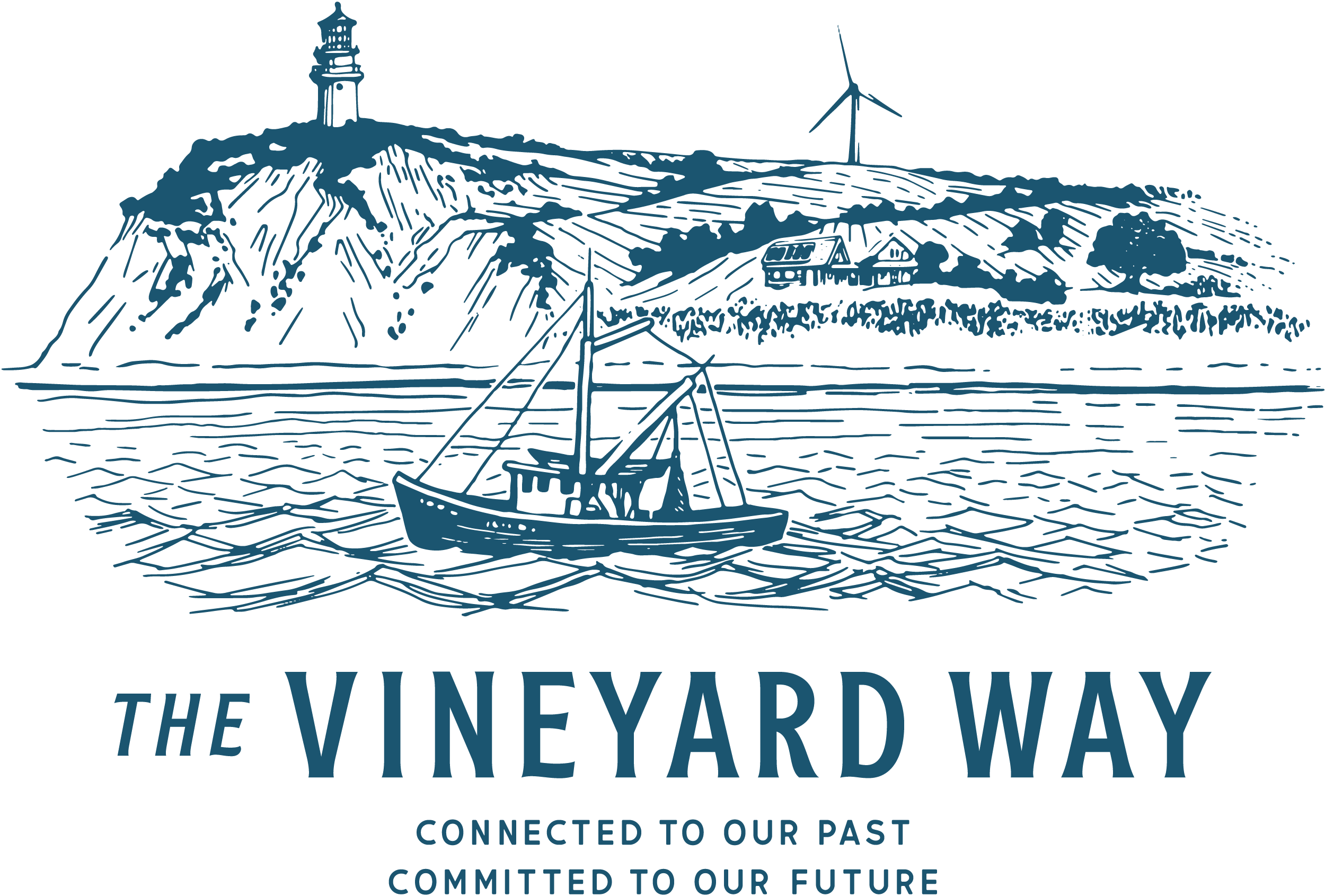The Climate Action Plan
Connected to Our Past, Committed to Our Future
In 2022, the Martha’s Vineyard Commission, together with our six distinct towns, the Wampanoag Tribe, and community partners came together to write the story of a tight-knit community that rises to the climate challenge by developing a climate action plan, The Vineyard Way. To do so, we drew on our connections to nature and each other to consider climate-resilient actions for our homes, roads, beaches, education and workforce, energy, and food. We’re navigating uncharted waters, but we’re doing it together.
Page Links

South shore beaches are moving inland 3 to 5 feet every year, the fastest rate of erosion on the eastern seaboard.

There were more than 1,700 Steamship Authority boat cancellations between 2018 and 2020 due to weather events.

Rates of Lyme disease on the Island have risen by 86% – faster than anywhere in the state.

An estimated 725 local Island jobs could be lost in vulnerable areas as the result of sea level rise and 100-year storms events by 2030.

Nearly 8,000 acres of land on the Island are devoted to agriculture, but climate change is threatening our food systems.

The Island currently sources 30% of its electricity from renewable sources, such as wind and solar.
Overarching Goals and Action Plan
Awaiting Resources
In Progress
Complete
Goal 1
By 2040, the Island community has combined historical knowledge and practices with proven technology and current climate change science to build social, environmental, and economic resilience to the impacts of climate change and to minimize contributions to its cause.
Objective 1
By 2025, a collaborative framework for land use decisionmaking is developed that builds environmental and socioeconomic resilience.
Action 1.1
Develop a series of maps for Land Use and Biodiversity -areas that can provide public safety and biodiversity resilience.
2024
Action 1.2
Map and evaluate vulnerable business assets and areas for potential future relocation and a resilient future economy.
2024
Action 1.3
Complete town maps of transportation and infrastructure assets and vulnerabilities. Combine maps and ID areas of regional significance.
2024
Action 1.4
Identify collaborative long-term vision of environmental and socio-economic resilience to climate change.
2025
Action 1.5
Combine and review thematic group map layers to identify land use priorities that support the collaborative vision and areas of overlap/conflict.
2025
Action 1.6
Develop a land-use decision making framework and additional actions, regulations, policies needed to achieve collaborative vision.
2025
Action 1.7
Design a public information campaign to explain and build community support and political will for joint vision and land-use decision-making framework.
2025
Goal 2
By 2040, implementation of actions that build environmental and socio-economic resilience of our Island are being implemented through reliable and sustainable sources of funding.
Objective 1
By 2030, a policy framework is in place to support a sustainable finance mechanism that generates and distributes funds for Island-wide climate action.
Action 1.1
Complete a sustainable finance analysis to identify funding needs, and potential finance mechanisms that could be developed.
2024
Action 1.2
Work with towns and Dukes County to determine the best sustainable finance mechanism for Martha’s Vineyard.
2025
Action 1.3
Develop a sustainable finance policy framework to outline fee structure, disbursement protocol, and decision-making.
2027
Action 1.4
Work with towns to adopt sustainable finance policy framework.
2027
Goal 3
By 2040, climate change actions are being implemented through a team of professionals that are skilled in key capacities needed to support cross-cutting actions that build Island resilience.
Objective 1
At least one new climate-related position is hired annually to support implementation of key actions of the CAP.
Action 1.1
Hire a full-time grant writer at the MVC to identify funding sources and support grant proposal development with CAP leads.
2022
Action 1.2
Hire a Climate Communications Specialist to conduct strategic communications that support CAP goals and objectives.
2023
Action 1.3
Carry out a capacity needs assessment to identify and prioritize key positions needed to implement the CAP.
2023
Action 1.4
Explore new partnerships that can support capacity needs such as (graduate/legal students, fellowships).
Ongoing
Plan Development
In late 2021, the Martha’s Vineyard Commission (MVC) was awarded a grant from the state’s Municipal Vulnerability Preparedness program to create a comprehensive Climate Action Plan for the Island. With that funding, the MVC’s Climate Action Task Force, along with dozens of community representatives, worked together to identify priorities for addressing our vulnerabilities and strategies for mitigating our emissions. The Climate Action Plan was completed in August of 2022.
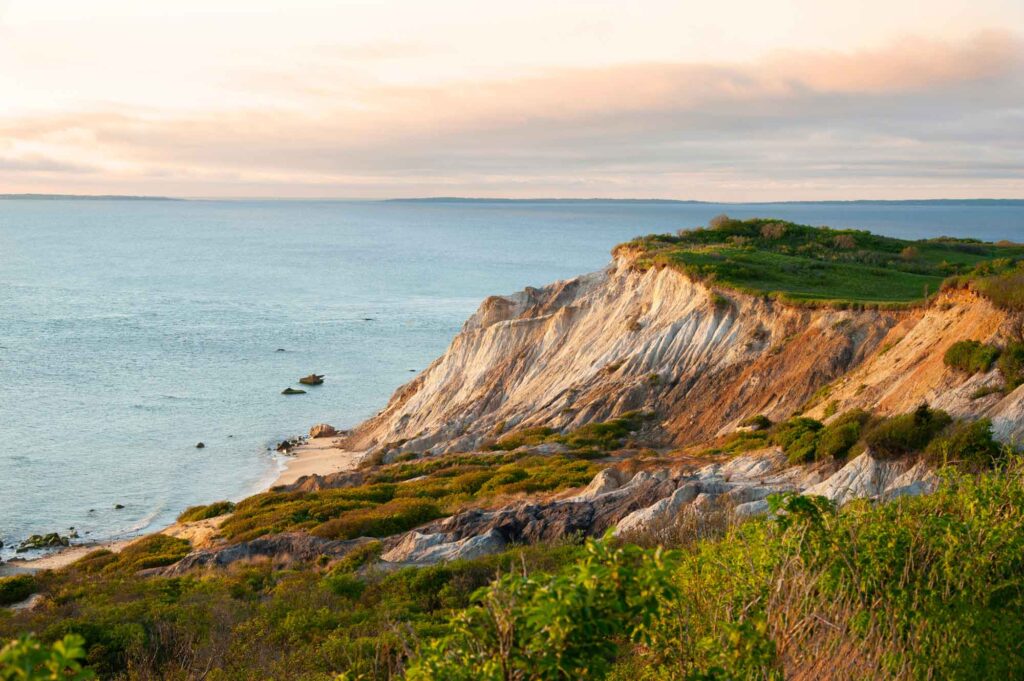
Land Acknowledgement
We acknowledge that the land and water addressed in this climate action plan is the traditional land and water of the Wampanoag people. We acknowledge the Wampanoag people’s reverent stewardship of the natural world, of which we are all a part.
With deep respect for the Wampanoag community, we strive in this plan to nurture the natural environment that sustains us all.
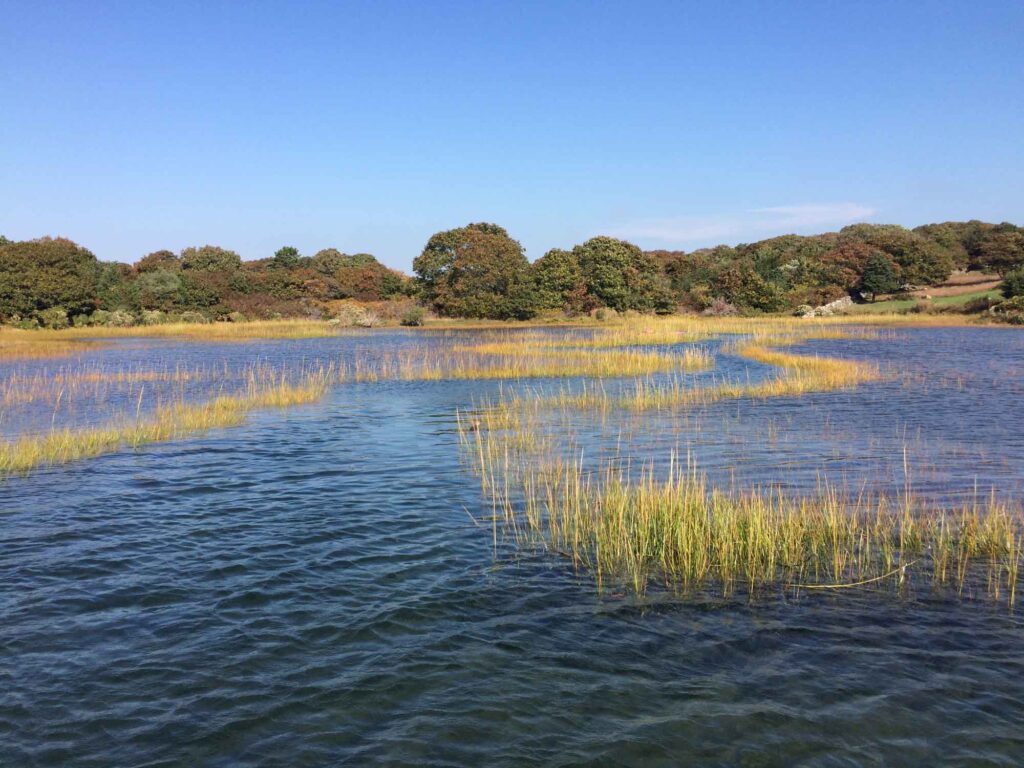
Our Purpose
The Vineyard Way is our guide to reducing greenhouse gas emissions, managing the impacts of climate change, and creating a healthier and more resilient community for everyone.
As an Island community, we face unique climate-related challenges including sea level rise, and stronger storms with higher storm surges. These and other impacts will affect our health and safety natural resources, transportation, infrastructure, and our largely seasonal, visitor-based economy. By proactively preparing for these impacts, we will be more prepared and better able withstand their effects.
Our Story
In 2019, the Martha’s Vineyard Commission (MVC), the Island’s regional planning agency, established a Climate Action Task Force. In 2020, the MVC hired its first climate change coordinator. The next goal was to develop a Vineyard Climate Action Plan (CAP). The plan was titled The Vineyard Way to reflect the community’s spirit of good will toward each other and care for the environment. Thus, in addition to the physical impacts of climate change, the CAP focuses on equity for the Island’s vulnerable population, social and economic resilience, and nature-based climate solutions. To achieve this, the CAP combines lessons from the past with new ideas and emerging technology.
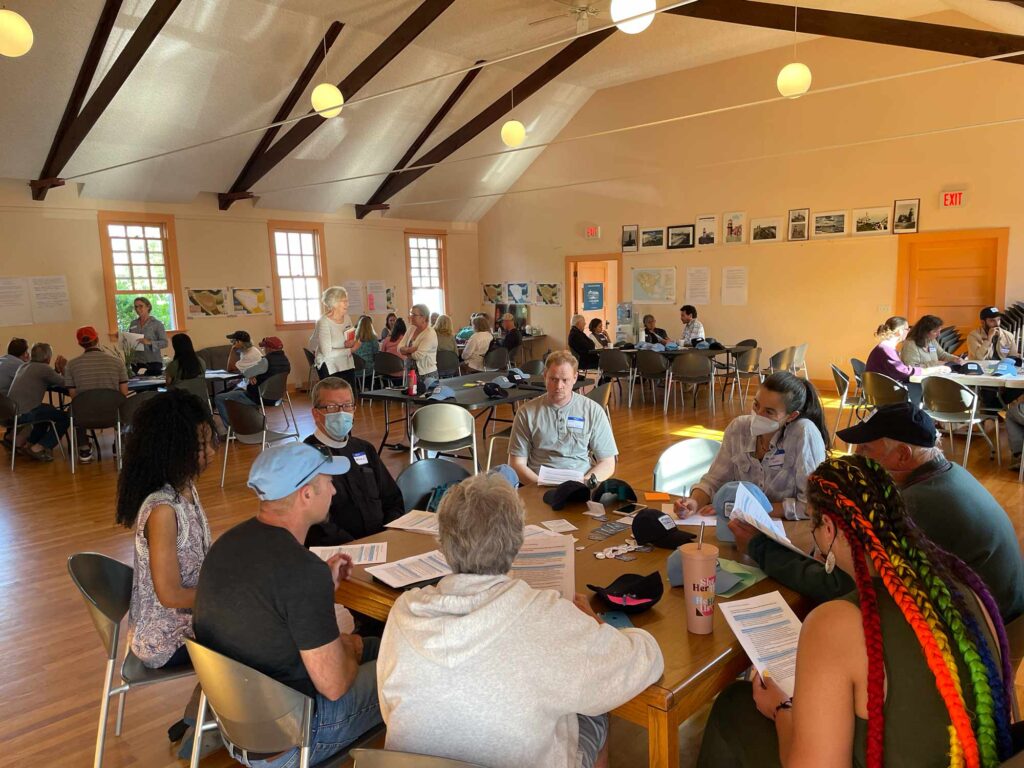
Developing the Plan
The locally based approach to planning and outreach was aimed at strengthening our resilience by building on the capacity of our local leaders to organize, communicate, and facilitate the development of collaborative climate solutions. The plan was facilitated by the Martha’s Vineyard Commission and guided by a steering committee. Six thematic working groups made up of town representatives, Tribal members, NGO’s, businesses, and youth developed long term regional goals, objectives, priority actions, and measures of success.
Engaging Our Community
Our plan was built from the ground up. Throughout our planning process we engaged businesses, policymakers, and residents to help shape the plan and get our community involved in climate action. During the process, there were:
- 40 planning meetings
- 6 student led climate cafes,
- 19 monthly outreach events
- 1 tribal engagement workshop
- 93 town staff presented to for feedback
- 40 events during the Climate Action Week celebration with over 1400 participants.
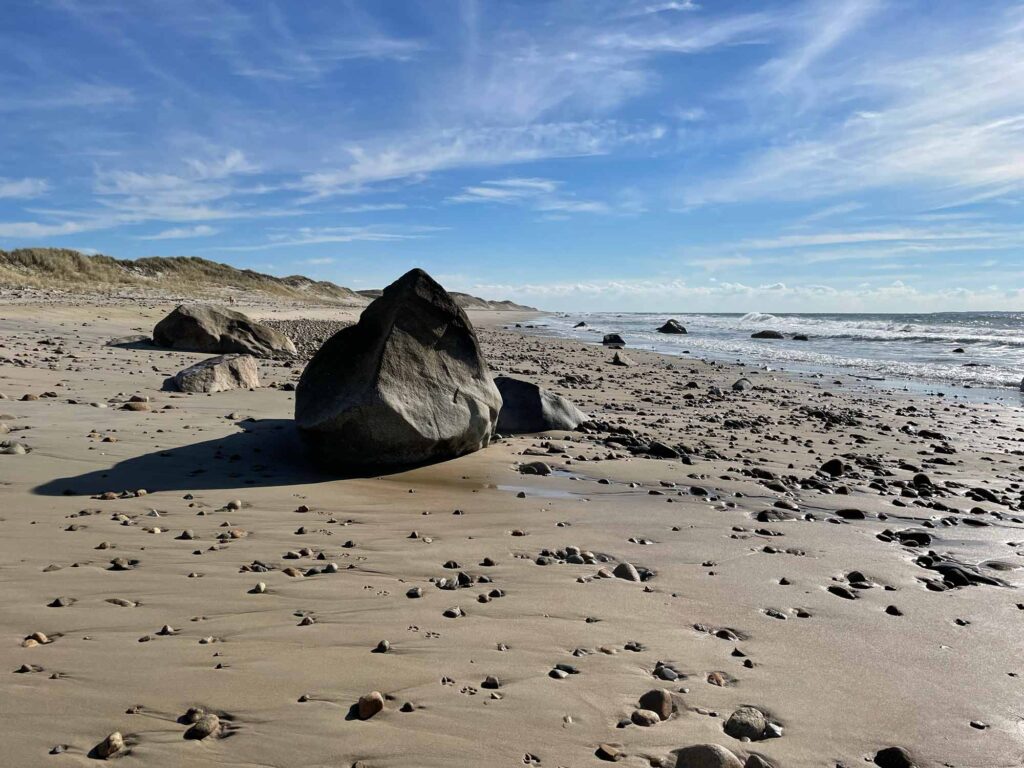
The Plan's Foundation
This planning process built off the previous work completed by each Vineyard town. Beginning in 2018, each town engaged in MVP Community Resilience Building workshops to identify key vulnerabilities. Most towns have created energy/climate committees. All towns are engaged in the MA Green Communities Program, which assists towns in reducing their carbon footprints. All towns, the Tribe, the Martha’s Vineyard Commission, and many local organizations have received funding to address climate change resiliency.
- Aquinnah: Municipal Vulnerability Preparedness & Hazard Mitigation Plan, 2020
- Edgartown: Community Resilience Building Workshop Findings, 2019
- Oak Bluffs: Community Resilience Building Workshop Findings, 2019
- Vineyard Haven (Tisbury): Tisbury Municipal Vulnerability Preparedness Workshop, 2018
- West Tisbury & Chilmark: Community Resilience Building Workshop Findings, 2018

from the MVC Executive Director
To the Island Community:
Connected to Our Past, Committed to Our Future
This is the theme of the 2022 Martha’s Vineyard Climate Action Plan. The Vineyard Way is a testament to the values of connectedness, commitment, and community.
Our very existence is tied to the land and water that surrounds us. Likewise, the climate change impacts we face are linked both to each other and to us. Humans are the main cause of the warming atmosphere, for example, which is causing the oceans to rise and erode the beaches that drive our local economy.
Learning lessons from the past, such as the Wampanoag people’s reverence for the natural world, will help build a more resilient future. The actions proposed in this plan connect climate resilience to quality of life. Clean, renewable energy is good for our health. Preserving our salt marshes protects the marine food chain, pond water quality, and helps control coastal flooding. Climate change-related job training helps turn climate challenges into opportunities. A focus on equity enhances the common good.
As Island dwellers we are dependent on each other. Climate change does not abide town boundaries; we are all experiencing the same impacts. This plan was developed by your neighbors and friends. It will be implemented by a wide range of community organizations and the MVC, your regional planning agency that is committed to quality research and science-based decision-making.
The Island community came out in force for Climate Action Week in May 2022. Together we can build a strong, safe, and just foundation for the future. The Vineyard Way details the next chapter of a community rallying together to protect what makes life here special.
We are grateful to the MA Municipal Vulnerability Preparedness Program for funding our Climate Action Plan.
Sincerely,
Adam Turner
Executive Director, Martha’s Vineyard Commission
